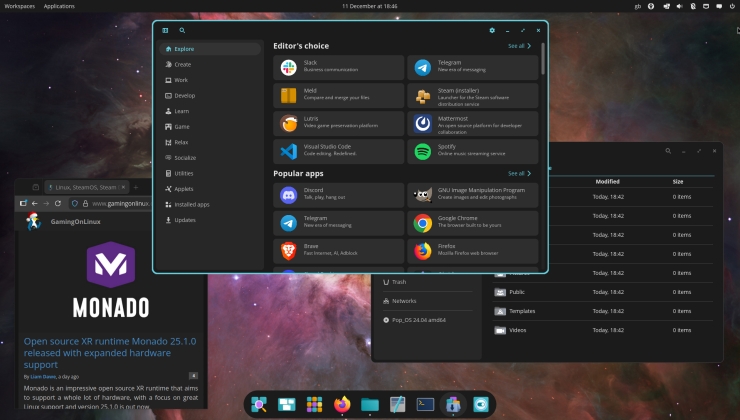NVIDIA have announced some big changes are coming to their Linux drivers, which will start with the upcoming 560 series.
Writing in an update on the NVIDIA forum they said:
Starting in the release 560 series, it will be recommended to use the open flavor of NVIDIA Linux Kernel Modules wherever possible (Turing or later GPUs, or Ada or later when using GPU virtualization).
If installing from the .run file, installation will detect what GPUs are present and default to installing the open kernel modules if all NVIDIA GPUs in the system can be driven by the open kernel modules. Distribution-specific repackaging of the NVIDIA driver may require additional steps, specific to that packaging, to choose the open flavor.
In the release 560 series, it will still be possible to configure the .run file to install the proprietary flavor of kernel modules, with the
--kernel-module-type=proprietarycommand line option. However, in the future, some GPUs may only be supported with the open flavor.
We still have the 555 Beta to come this month which will bring Explicit Sync support. So this will be the update after that.
Interesting though to see NVIDIA move more and more towards open source. We've seen recently how the former Nouveau driver lead joined NVIDIA and sent a massive patch set, and then we had news that an NVIDIA developer contributed to the open source NVK driver and even on top of that they put up a script for GeForce NOW on Steam Deck.
Certainly an interesting time for the green camp.
Quoting: TheRiddickWell if they enable support for [takes deep breath], CUDA, DLSS, DLSS3, DLSS4, FrameGen, HDR, 10bit colour, VRR, GSYNC... did I miss any of their proprietary crap? oh right PhysX stuff.proprietary... yes
crap... no
I'm sure that the linux driver supports most of those already except FrameGen
I've heard of 10 (30) bit colour being available now.
Quoting: TuxThePenguinI've heard of 10 (30) bit colour being available now.It's in experimental, but I get worse color in Wayland and certainly when HDR is enabled. So with it needs work or plasma/wayland/linuxHDR needs work to support NVIDIA better. I do not know which it is.
Quoting: Viesta2015One thing we know for sure is that if Nvidia is doing something, the movtive is pure profit. Let's just hope it's not some A.I. thing that has nothing to do with gaming.Quoting: elmapulBest case scenario would be a valve home console... along with an updated VR Set and have them both separate... it'd allow others to use any piece of VR equipment they wish and use it as a general PC if people wanted. :)Quoting: lejimsterI thought I had seen a lot of news related to Nvidia and open source projects lately. I wonder... Maybe they are involved in a piece of hardware Valve are making? We know Valve want the ability to fix driver issues as they arise which is only possible if the drivers are open source.either a valve home console, or VR Headset or just steamOS general relase...
i doubt steamdeck 2 will go nvidia
(especially with steam link on quest 3)
Quoting: elmapulImagine a Nvidia-powered Steam OS home console box focused on high-performance, RTX, and PCVR.Quoting: lejimsterI thought I had seen a lot of news related to Nvidia and open source projects lately. I wonder... Maybe they are involved in a piece of hardware Valve are making? We know Valve want the ability to fix driver issues as they arise which is only possible if the drivers are open source.either a valve home console, or VR Headset or just steamOS general relase...
i doubt steamdeck 2 will go nvidia
Quoting: JuliusThis is all about GPUs in datacenters for AI and so on.This would be my guess, too.
Or perhaps Nvidia forsees the final enshittification step of Microsoft over the edge into to the cesspool.
And with >10% Linux desktop share, their customers will need an reliable easy to use driver as the one AMD users have.
Quoting: melkemindI disagree.Quoting: Viesta2015One thing we know for sure is that if Nvidia is doing something, the movtive is pure profit. Let's just hope it's not some A.I. thing that has nothing to do with gaming.Quoting: elmapulBest case scenario would be a valve home console... along with an updated VR Set and have them both separate... it'd allow others to use any piece of VR equipment they wish and use it as a general PC if people wanted. :)Quoting: lejimsterI thought I had seen a lot of news related to Nvidia and open source projects lately. I wonder... Maybe they are involved in a piece of hardware Valve are making? We know Valve want the ability to fix driver issues as they arise which is only possible if the drivers are open source.either a valve home console, or VR Headset or just steamOS general relase...
i doubt steamdeck 2 will go nvidia
(especially with steam link on quest 3)
I really hope it has nothing to do with gaming or anything I use Linux for.
In general it's much better to be a beneficiary of a market in which you don't actively partake than one in which you do.
If companies aim themselves at your market they will take all kind of measures to lock you in.
If you're a side effect they won't care enough.
Quoting: sprocketThe Opensource kernel modules support Turing and Newer......Quoting: tpauNow we need the same for <turing too :)As much as I would like this, they have to draw the line somewhere when it comes to old architecture support. For them that is Turing, which made its debut in 2019. And as much as I hate to say it, 5 years is pretty typical for hardware support across most industries.
Still, the push for making the open kernel module a 1st class citizen is great news!
Quoting: sprocketAs much as I would like this, they have to draw the line somewhere when it comes to old architecture support. For them that is Turing, which made its debut in 2019. And as much as I hate to say it, 5 years is pretty typical for hardware support across most industries.There is a difference between keeping the necessary files and documentation from the community and writing the whole driver themselfes.
If they give us the , i think pmu it was called, part of the firmware, they could at least get a better standing in the community and say "here you go, figure it out, have fun" and continue with the modern gsp based driver.
Last edited by tpau on 12 May 2024 at 1:28 pm UTC
Quoting: melkemindFirst of all, the entire reason for _any_ company's existence is profit. You say that like it makes them particularly evil, but it doesn't. Yes, some company's have more goodwill than others, but your argument can't be "how dare they want profit?". What makes you think is the reason Linux itself is good? It's because numerous companies work on it purely for their own profit. There are very few developers left working on the kernel who aren't affiliated with a company.Quoting: Viesta2015One thing we know for sure is that if Nvidia is doing something, the movtive is pure profit. Let's just hope it's not some A.I. thing that has nothing to do with gaming.Quoting: elmapulBest case scenario would be a valve home console... along with an updated VR Set and have them both separate... it'd allow others to use any piece of VR equipment they wish and use it as a general PC if people wanted. :)Quoting: lejimsterI thought I had seen a lot of news related to Nvidia and open source projects lately. I wonder... Maybe they are involved in a piece of hardware Valve are making? We know Valve want the ability to fix driver issues as they arise which is only possible if the drivers are open source.either a valve home console, or VR Headset or just steamOS general relase...
i doubt steamdeck 2 will go nvidia
(especially with steam link on quest 3)
And yes, of course it's some AI reason. AI is the hottest thing right now, and Nvidia's hardware happens to be really good at it. OpenAI and Google may be in a battle over AI, but they all come to Nvidia for hardware, and that's a LOT of hardware. If any of them asks Nvidia to open source anything, they will because money talks.
Last edited by ShabbyX on 12 May 2024 at 3:49 pm UTC
Quoting: PeffseThat was without proton and hoping people would just make native linux ports... and they had multiple versions with different hardware which was bound to be a bust. If they just make VR worthy hardware that doesn't vary too much it'd probably be the best thing to happen to the PC-VR industry and an awesome thing to happen with PC's in generalQuoting: Viesta2015Best case scenario would be a valve home console... along with an updated VR Set and have them both separate... it'd allow others to use any piece of VR equipment they wish and use it as a general PC if people wanted. :)Didn't they already try and fail with console hardware by releasing the Steam Link?
(especially with steam link on quest 3)
This is pretty much how I still picture Nvidia today as I do back in the early 2000's, when they refuse to open source their graphics drivers while ATI Radeon (before AMD acquired them) did. They can contribute to the open kernel module all they want but unless they start providing open source graphic drivers, I'm not interested in what they do.
Last edited by ToddL on 12 May 2024 at 3:31 pm UTC
Quoting: ToddL"The more things change, the more they stay the same"Your timeline is entirely wrong. Ati didn't open source their drivers; they had the proprietary fglrx (which was terrible) and they provided some information to some open source developers under NDA - the open source drivers were predominantly reverse-engineered (just like nouveau). AMD didn't switch their focus from fglrx to the open source drivers till a year after they'd bought Ati - after pressure and an implementation from Novell.
This is pretty much how I still picture Nvidia today as I do back in the early 2000's, when they refuse to open source their graphics drivers while ATI Radeon (before AMD acquired them) did. They can contribute to the open kernel module all they want but unless they start providing open source graphic drivers, I'm not interested in what they do.
So comparable to AMD their situation is still much worse. The only improvement is potentially better alignment with kernel releases. So don't think Nvidia is a lot more open source friendly now because of all this.
Last edited by Shmerl on 12 May 2024 at 8:06 pm UTC
Quoting: CatKillerThanks for correcting me on this. I keep forgetting all these details.Quoting: ToddL"The more things change, the more they stay the same"Your timeline is entirely wrong. Ati didn't open source their drivers; they had the proprietary fglrx (which was terrible) and they provided some information to some open source developers under NDA - the open source drivers were predominantly reverse-engineered (just like nouveau). AMD didn't switch their focus from fglrx to the open source drivers till a year after they'd bought Ati - after pressure and an implementation from Novell.
This is pretty much how I still picture Nvidia today as I do back in the early 2000's, when they refuse to open source their graphics drivers while ATI Radeon (before AMD acquired them) did. They can contribute to the open kernel module all they want but unless they start providing open source graphic drivers, I'm not interested in what they do.
Quoting: ShmerlAnother thing to point out. The reason Nvidia are cool now with open source kernel module is becasue they moved most of their driver into their firmware blob which does remain a blob. So kernel module is just a glorified shim at this point.There is one advantage.
So comparable to AMD their situation is still much worse. The only improvement is potentially better alignment with kernel releases. So don't think Nvidia is a lot more open source friendly now because of all this.
The firmware blob currently actively favors the proprietary driver by exposing less options to the nouveau driver.
With the open source kernel module this becomes either more easy spoofable or a thing of the past.
EDIT:
Another advantage I just thought off
Kernel modules can easily sandbox hardware, sandboxing a kernel module requires a complete overhaul of the kernel.
Last edited by LoudTechie on 13 May 2024 at 11:43 am UTC
Quoting: Augustus-OctavianWhat is the broader implication of this, explain this for a noob please :grin:By itself the implications aren't huge.
Historically all of the Nvidia driver on PCs was closed source. Binary blob user space and binary blob kernel modules. But the kernel is GPL and the kernel devs want things in the kernel (rather than running on the kernel) to be GPL. That conflict between GPL and proprietary on the interface of the kernel has led to a lot of tension and a lot of friction.
Having a clear boundary between open source kernel modules and proprietary user space & firmware removes all of that, without the need for GPL condoms or other shenanigans.
Nvidia having open source kernel modules at all is a big step in the right direction. Nvidia making the open source kernel modules the default going forward is another big step in the right direction.
But in terms of end user impact, there ideally won't be any: things will just continue to work whichever modules you're using. It'll just be less frustrating, and hopefully more efficient, for the people doing the nitty-gritty of making a particular bit of hardware work well.












 How to setup OpenMW for modern Morrowind on Linux / SteamOS and Steam Deck
How to setup OpenMW for modern Morrowind on Linux / SteamOS and Steam Deck How to install Hollow Knight: Silksong mods on Linux, SteamOS and Steam Deck
How to install Hollow Knight: Silksong mods on Linux, SteamOS and Steam Deck